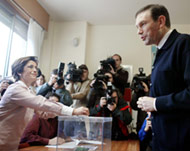Basque radicals gain in regional polls
Basque premier Juan Jose Ibarretxe has emerged weakened after Sunday’s vote for the regional parliament, with radical separatists putting in a stunning performance that could give them sway over the next government.

Ibarretxe and his moderate Basque Nationalist Party had been seeking endorsement of their plan for near independence from Spain, but, instead, lost four of their 33 seats in the 75-member legislature, threatening the party’s 25-year grip on power.
Meanwhile, the Communist Party of the Basque Lands came in a surprisingly strong fourth place with the backing of Batasuna, a party banned as the political wing of armed separatists ETA.
That development was decried by the right-of-centre Popular Party, as giving ETA, classed as a terrorist group by Spain and the European Union, representation in parliament.
“ETA, for the first time, was not going to be in the Basque parliament and now it has increased its number of members from seven to nine and, what’s more, has become the arbiter of the situation,” former interior minister Angel Acebes said.
Evenly split
Acebes blamed Socialist Prime Minister Jose Luis Rodriguez Zapatero for not trying to ban the communists after they won the endorsement of Batasuna.
Results showed the restive region still about evenly split between Basque nationalists, seeking greater autonomy from Madrid, and Spaniards, who support territorial unity.
 |
|
Basque premier Ibarretxe could |
But the pro-Spanish parties picked up one potentially crucial seat from the nationalists.
Ibarretxe could muster a minority government with 33 seats and no immediate prospects for an absolute majority of 38 unless the communists came to his aid.
“We have won the elections,” Ibarretxe told cheering supporters, denying the result was “bittersweet”.
“The game has become a little complicated, but we are going to win,” Ibarretxe said.
Hotly contested
Meanwhile, the Spanish parties – the Socialists and the right-of-centre Popular Party – also have 33 seats between them.
Though they are fierce rivals across Spain, the Socialists and the Popular Party have talked about teaming up in the Basque country if it meant unseating Ibarretxe’s PNV.
|
“ETA … has increased Angel Acebes, |
“It may not be today, but in the short term we could see the Socialists governing. No matter what happens, it won’t be boring,” Gorka Knorr, a former member of parliament for PNV coalition partner Eusko Alkartasuna, said.
In the hotly contested battle for second place among the two big Madrid-based parties, the ruling Socialists overtook the Popular Party to reverse the latter’s rising trend in the Basque Country and set themselves up as the non-nationalist option.
The election campaign has been free of violence by ETA, still the most active guerrilla group in Western Europe and responsible for more than 800 killings since 1968 to press its demands for Basque independence.